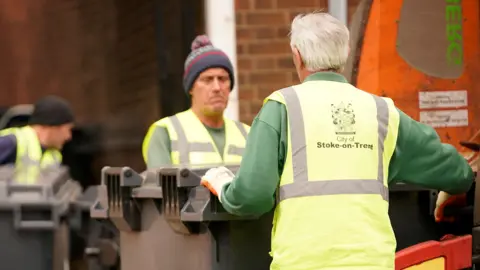More struggling councils to sell assets and borrow cash
 Getty Images
Getty ImagesThe government has agreed to relax budgeting rules for a record 29 English councils to allow them to balance their books next year.
The authorities will be allowed to use Treasury loans or cash from selling assets to cover day-to-day spending, which they are normally banned from doing.
The figure is up from 19 that requested such flexibility this year, further underscoring the continued financial fragility of the sector.
Ministers will, however, encourage councils not to sell off "community and heritage assets" to help meet current spending pressures.
It remains to be seen what this means in practice, with the government leaving it to authorities to decide which assets meet this definition.
Councils in England will have £69.4bn to spend next year, assuming they increase council tax by the maximum allowed, a 4.3% real-terms rise from this year.
But local leaders argue this will not cover the increasing cost of mandatory services such as adult social care and special educational needs, which have eaten up a growing share of their budgets in recent years.
On Thursday, the government confirmed 29 councils have requested additional wriggle room to balance their budgets next year, worth a collective £1.5bn, under financial support rules introduced during the Covid pandemic.
Details of how exactly each council plans to balance its books will be published at a later date in a series of so-called capitalisation directions.
They include six councils - Birmingham, Croydon, Woking, Nottingham, Thurrock and Slough - that have effectively declared bankruptcy in recent years and requested similar help last year.
Those asking for the flexibility for the first time include Enfield, Worcestershire, West Berkshire, Trafford, Barnet, Solihull, and Halton.
Nineteen were given such flexibility this year, up from eight in 2023, which in turn was more than the five receiving it in 2022.
'Short-term measure'
The 29 councils will be able to use money raised through selling assets, such as land and buildings, to cover their day-to-day spending costs.
Normally town halls can only use cash from such asset sales on projects designed to reduce their operating costs, such as merging back-office functions or moving services online.
They will also be allowed to cover current spending using Treasury-backed loans normally reserved for long-term investment.
The government has also confirmed it is removing a 1% surcharge on using Treasury loans in this way, with local government minister Jim McMahon saying the government believed in "partnership - not punishment".
The premium, which some council leaders have compared to the fees on pay-day loans, was previously seen as a way to encourage councils into selling assets rather than going for government lending.
Funding changes
London Councils, an umbrella group for authorities in the capital, said the extra budget flexibility was a "short-term measure" that "leaves us with more long-term debts to worry about".
The government argues changes such as allowing councils to set multi-year budgets, a Labour manifesto pledge, will allow them to put themselves on a more secure financial footing.
Ministers are also consulting on introducing a stronger link between overall funding and deprivation from 2026, as part of a wider shake-up of council financing.
They argue this will make the system fairer because councils in poorer areas are less able to raise income locally.
They have promised the new formula will take into account the "impact of rurality" - but they could have a political row on their hands, with Conservative-run councils in more rural areas likely to argue they are being unfairly funded.
